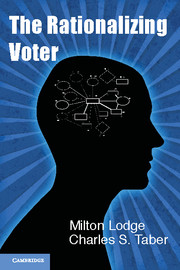Book contents
- Frontmatter
- Contents
- List of Tables
- List of Figures
- Preface
- 1 Unconscious Thinking on Political Judgment, Reasoning, and Behavior
- 2 The John Q. Public Model of Political Information Processing
- 3 Experimental Tests of Automatic Hot Cognition
- 4 Implicit Identifications in Political Information Processing
- 5 Affect Transfer and the Evaluation of Political Candidates
- 6 Affective Contagion and Political Thinking
- 7 Motivated Political Reasoning
- 8 A Computational Model of the Citizen as Motivated Reasoner
- 9 Affect, Cognition, Emotion
- Bibliography
- Index
8 - A Computational Model of the Citizen as Motivated Reasoner
Published online by Cambridge University Press: 05 March 2013
- Frontmatter
- Contents
- List of Tables
- List of Figures
- Preface
- 1 Unconscious Thinking on Political Judgment, Reasoning, and Behavior
- 2 The John Q. Public Model of Political Information Processing
- 3 Experimental Tests of Automatic Hot Cognition
- 4 Implicit Identifications in Political Information Processing
- 5 Affect Transfer and the Evaluation of Political Candidates
- 6 Affective Contagion and Political Thinking
- 7 Motivated Political Reasoning
- 8 A Computational Model of the Citizen as Motivated Reasoner
- 9 Affect, Cognition, Emotion
- Bibliography
- Index
Summary
Chapter 2 developed our JQP theory, grounded in social, cognitive, and neuropsychology, of how citizens develop and change their political beliefs and attitudes. It is a theory of the citizen as motivated reasoner, driven to rationalize the political thoughts and behaviors that are often caused by events and forces outside conscious awareness, some coming from within, as when prior attitudes motivate biases, and some coming from without, as when environmental cues trigger affective transfer or contagion. Chapters 3 through 7 presented empirical tests of our most basic assumptions as well as tests of several key implications of the theory. We now turn to a different kind of test, one that is common in cognitive science but less so in political science. In this chapter, we seek to establish the “completeness” of our theory as a functional description of human information processing, its internal coherence, its sensitivity to variations in basic assumptions, and its ability to perform as real citizens do in the fundamental task of democratic citizenship: the processing of information to create and update candidate preferences over the course of a political campaign. To accomplish this, we develop a formal computational model of our theory, test its internal processing mechanisms, and then test its empirical performance against that of a simpler Bayesian updating model in predicting the changing attitudes of real citizens in an actual political campaign (for full details, see Kim, Taber, and Lodge, 2010).
- Type
- Chapter
- Information
- The Rationalizing Voter , pp. 170 - 205Publisher: Cambridge University PressPrint publication year: 2013



